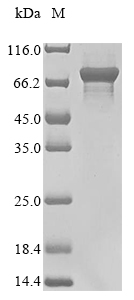Recombinant Escherichia coli Polyphosphate kinase (ppk) is produced in an E.coli expression system, spanning the full-length mature protein from amino acids 2 to 688. The protein comes with an N-terminal 10xHis-tag and a C-terminal Myc-tag to streamline purification and detection processes, reaching a purity level greater than 85% as determined by SDS-PAGE. This product is intended for research use only.
Polyphosphate kinase (PPK) in Escherichia coli plays a crucial role in synthesizing polyphosphate, a polymer that appears to be involved in energy storage and regulation of various cellular processes. PPK catalyzes the transfer of ATP's terminal phosphate to form polyphosphate, which is likely a vital component in bacterial stress response and survival. Studying this enzyme may be significant for understanding bacterial physiology and potential biotechnology applications.
Potential Applications
Note: The applications listed below are based on what we know about this protein's biological functions, published research, and experience from experts in the field. However, we haven't fully tested all of these applications ourselves yet. We'd recommend running some preliminary tests first to make sure they work for your specific research goals.
Escherichia coli Polyphosphate kinase (PPK) is a bacterial enzyme that requires precise folding, proper ATP-binding site formation, and specific tertiary structure for its functional activity in polyphosphate synthesis. The E. coli expression system is homologous to this bacterial protein, which significantly increases the probability of correct folding and functionality. The dual N-terminal 10xHis-tag and C-terminal Myc-tag are relatively small and may cause minimal steric interference. The full-length mature protein (2-688aa) contains all functional domains. While the homologous expression system strongly favors proper folding, experimental validation of enzymatic activity is still recommended to confirm full functionality.
1. In Vitro Polyphosphate Synthesis Assays
This application is highly suitable if the enzymatic activity is validated. PPK's polyphosphate synthesis function requires proper folding and ATP-binding capability. The homologous E. coli expression system strongly supports correct folding. If verified active through enzymatic assays, the protein is excellent for kinetic and mechanistic studies. The small tags are unlikely to interfere significantly with enzyme function.
2. Protein-Protein Interaction Studies
This application is well-suited given the homologous expression system. PPK interactions with native bacterial proteins should be replicable if the protein is properly folded. The dual tagging system provides flexibility for various pull-down approaches. The high purity minimizes non-specific binding concerns.
3. Antibody Development and Validation
This application is highly suitable as antibody development relies on antigenic sequence recognition. The full-length protein provides comprehensive epitope coverage for generating PPK-specific antibodies. The high purity ensures minimal contamination issues during immunization protocols.
4. Structural and Biophysical Characterization
These studies are highly suitable for this recombinant protein. The homologous expression system ensures proper folding, and the high purity supports quality structural biology work. The tags can be utilized for purification or removed if necessary for crystallography studies.
5. Enzyme Inhibitor Screening Assays
This application is well-suited after activity validation. The homologous expression produces a natively folded enzyme ideal for inhibitor screening. The tagging system facilitates easy purification and quantification needed for high-throughput screening formats.
Final Recommendation & Action Plan
The E. coli expression system is ideal for producing this homologous PPK enzyme, as it provides the native folding environment necessary for proper structure and function. Begin with enzymatic activity validation using standard polyphosphate synthesis assays to confirm functionality. Once activity is verified, all five applications are highly suitable. The small dual tags are unlikely to interfere with function, and the high purity supports diverse experimental applications.






